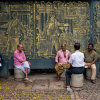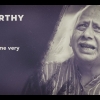Much admired and much attacked, V.S. Naipaul's writing speaks of the contradictions that created him (Photo Source: Wikimedia Commons)
V.S. Naipaul’s novel A House for Mr Biswas was a title that all Indian students of English Literature at the Honours and Postgraduate level know very well, though they may not have read the book. I clearly remember that after having joined the postgraduate department of Calcutta University as an Assistant Professor, Naipaul’s A House for Mr Biswas was included in the Indian English literature optional course. Soon after, however, the book was dropped from the syllabus with alacrity. The senior faculty members responsible for the faux pas realized soon enough that Naipaul was a British citizen, he was born in Trinidad, his first visit to India was in 1962 and like many second and third generation migrant writers whose place of familial origin was India, he was actually a tourist to India, a visitor and in fact an outsider.
But Indian readers have often admired Naipaul unreservedly. They quarrelled with his views about India, they engaged in numerous intellectual debates but they still felt that his roots were deep and despite his British passport Naipaul was often regarded as “ours”. Indian readers have resented distancing diasporic writers so we find Jhumpa Lahiri still is regarded as “our Bengali girl - Banglar meye”, though she was born in Britain and grew up in Boston, America. Understandably, Naipaul had the complex reputation of being attached to his Indian origins and yet declared an outsider due to his Anglocentric detachment about being regarded as Indian. But then despite growing up in Trinidad, Naipaul did not feel he was West Indian either. So in 2008 at the Calabash International Lit Fest held in Jamaica, Naipaul’s contemporary, the West Indian poet Derek Walcott (1930–2017), who won the Nobel prize in 1992, made a scathing attack on Naipaul who had at one time mocked the West Indians as “monkeys”. In the inaugural session of the literary festival, Walcott read from his poem Mongoose, a poem bristling with undisguised personal attacks on Naipaul:
"I must have been bitten
I must avoid infection
Or else I will be as dead
As Naipaul’s fiction."
The demise of Sir Vidiadhar Surajprasad Naipaul (August 17, 1932–August 11, 2018), popularly addressed as V.S. Naipaul or Vidia Naipaul, received mixed responses in the many obituaries and tributes. Naipaul was born in Trinidad and was a British citizen. His grandfather was an indentured labourer from India who settled in Trinidad in the Caribbean islands; working in the sugar plantations there. Naipaul’s father trained himself as a journalist and it was he who instilled the passion of creating words in his son, V.S. Naipaul, who went on to win the Nobel Prize for literature in 2001.
I was present at the reception accorded to Naipaul at the Oxford Bookstore, Park Street, Kolkata on November 18, 2004. At that time, I was the Chairperson of the Commonwealth Writers Prize and interestingly among almost one hundred books that were entries submitted for the competition I received Naipaul’s 14th novel Magic Seeds published in 2004. Eventually, the jury panel of the Commonwealth Writers Prize did not nominate the book for the award.
In the talk he delivered at the Oxford bookstore that year on November 18, Naipaul expressed his regret that in the 21st century, readers and writers seemed to show a marked preference for “oddities” rather than human values. Therefore, the focus was on the lives of the disabled, physically-challenged individuals and their struggle for survival. Special people, physically or mentally disabled and their struggle to survive seemed to have become far more attractive as subject matter than the issues of traditional human relationships. Naipaul asserted that though the micro-politics of daily living was primarily still the subject matter of fiction, fiction which seemed to win awards and won public acclaim were those that experimented with butterfly effect, fractal images, new technologies, the dilemma of fluid identities and self-reflexivity of postmodern times.
Moreover, in early 2004, Naipaul asserted that literature is being “debased” by “little green men, wizards, hobbits and ghosts”, in his inaugural speech as the Guest of Honour at the World Book Fair held in Delhi. Referring to the objectives of literature Naipaul had said, “Literature is supposed to be a reflection of the world we inhabit…" and then added, “Literature is on the verge of extinction because publishers are only interested in seeking stories that can be turned into marketing triumphs”. (The Statesman, February 15, 2004)
As he had stated in his Nobel acceptance speech, Naipaul insisted he was a peripatetic writer, he claimed he was rootless and his writing defined his identity. Naipaul unmistakably seemed rather brash and pompous in his critique of his experiences in India, as a cultural commentator. So Naipaul’s non-fictional narratives focusing on India such as Area of Darkness, India: A Wounded Civilization and India: A Million Mutinies Now often seem disturbingly idiosyncratic, arrogant and betray ignorance about India. Instead of a holistic understanding of India, Naipaul exuded the essentialist Western attitude of regarding India through the magisterial approach, the exoticist approach and the curatorial approach, categorized by Amartya Sen. It is perhaps this attitude that made Walcott attack Naipaul in his poem wherein he wrote, “The mongoose takes its orders from the Raj.”
But then Naipaul is not so easily understood as he'd be if he was a combination of Rudyard Kipling and Nirad C. Choudhuri. In India: A Wounded Civilization, Naipaul’s sincere sentimental tone is unmistakable as he is overwhelmed by the phantasmagoria which is an integral part of India when he says, “India for me is a difficult country. It isn’t my home and yet I cannot reject it or be indifferent to it…Because in myself, like the split-second images of infancy which some of us carry, there survive, from the family rituals that lasted into my childhood, phantasmal memories of old India which for me outline a whole vanished world.” This indeed can be regarded as a classic example of not just a genealogical analysis but perhaps can be extended to a prosopographical approach.
I think Naipaul’s self-assessment as a writer as he defined his role as a writer in his Nobel Prize acceptance speech in 2001, is the best summing up that he accorded himself. Despite the mixed opinions about Naipaul as a writer and a person, Naipaul’s contribution to the world of letters will be regarded as outstanding, fascinating in its contradictions and timelessness:
“I said earlier that everything of value about me is in my books. I will go further now. I will say I am the sum of my books. Each book, intuitively sensed and, in the case of fiction, intuitively worked out, stands on what has gone before, and grows out of it. I feel that at any stage of my literary career it could have been said that the last book contained all the others…It’s been like this because of my background. My background is at once exceedingly simple and exceedingly confused”.













